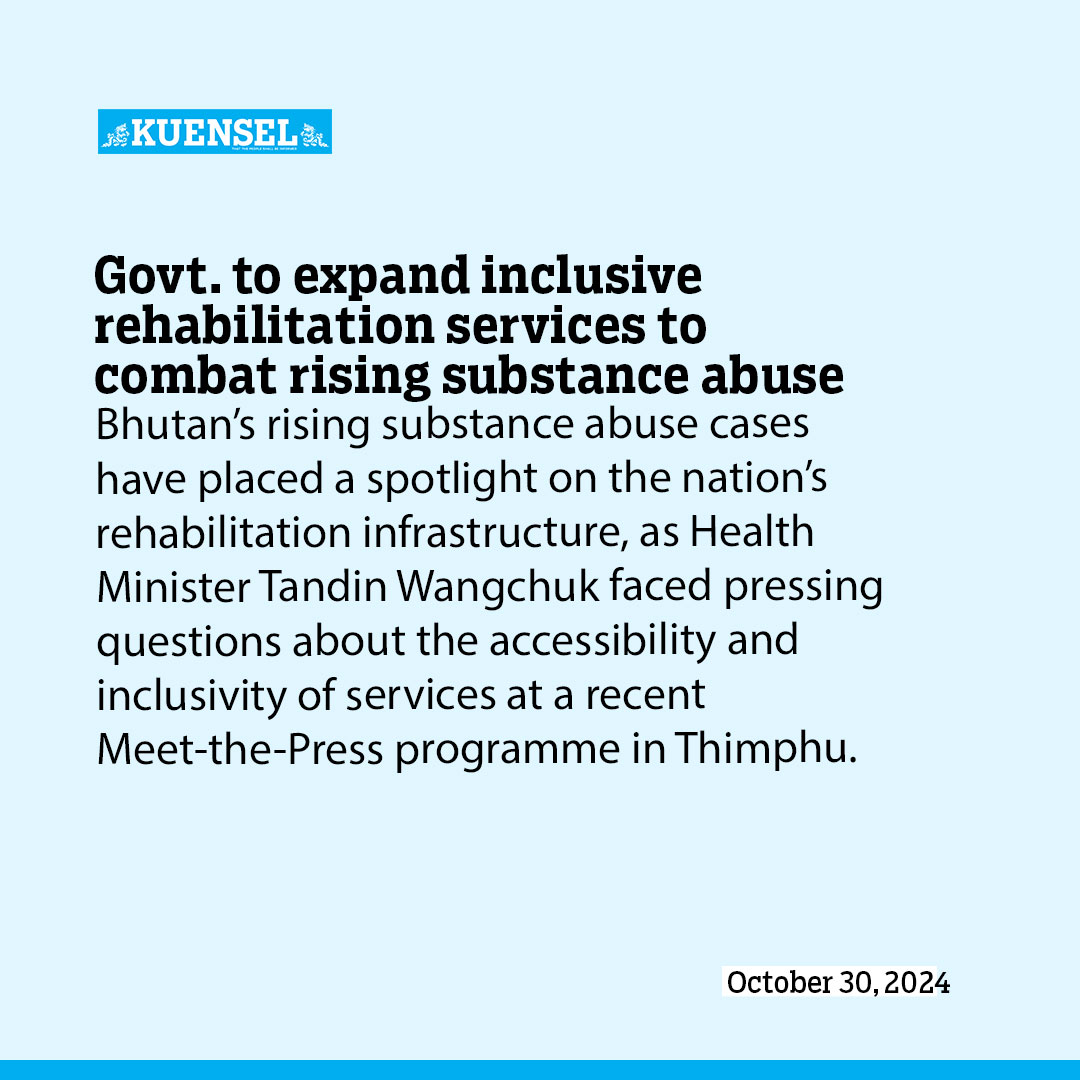Jigmi Wangdi
Bhutan’s rising substance abuse cases have placed a spotlight on the nation’s rehabilitation infrastructure, as Health Minister Tandin Wangchuk faced pressing questions about the accessibility and inclusivity of services at a recent Meet-the-Press programme in Thimphu. Concerns mounted over the lack of gender-specific facilities and limited geographical reach, raising doubts about the country’s readiness to address the growing crisis effectively.
Lyonpo Tandin Wangchuk acknowledged the lack of gender-specific public rehabilitation centres in Bhutan, particularly for women. He emphasised that efforts are underway to expand treatment options and ensure more inclusive care, signalling the government’s commitment to addressing this pressing gap.
“Currently, there are no rehabilitation centres exclusively for women,” he said.
Lyonpo emphasised on the ongoing efforts to enhance inclusivity in Bhutan’s substance abuse treatment services, including the upcoming opening of a national drug treatment and rehabilitation center in Thimphu, expected to be operational next month. This facility will provide dedicated beds for both men and women, signaling a shift toward a more inclusive treatment approach.
Lyonpo underscored the role of the PEMA Secretariat in expanding hospital-based substance use disorder (SUD) treatment services to accommodate both genders.
“The PEMA Secretariat has introduced hospital-based substance use disorder (SUD) treatment and care services in hospitals that accommodate both male and female patients,” Lyonpo said, explaining that this approach aims to integrate substance abuse care into Bhutan’s broader healthcare system.
This integration is expected to ensure that individuals, regardless of gender, have access to support within their local hospitals.
Addressing geographic limitations, the minister acknowledged that rehabilitation centres are concentrated in certain dzongkhags, with resource constraints hindering wider distribution. However, he clarified that the current placement of centres is guided by data-driven decisions to ensure they are strategically located based on demand.
“Of the over 8,000 drug offenders arrested by the Royal Bhutan Police from 2019 to 2023, approximately 83 percent of cases originated from the western regions, which justifies the government’s focus on this area,” Lyonpo said.
Concentrating resources in high-need areas is intended to maximise the effectiveness of rehabilitation efforts, even if nationwide coverage remains limited.
Acknowledging the gaps in rehabilitation services, Lyonpo detailed several strategic initiatives the government has undertaken. For example, under the leadership of Her Majesty The Gyaltsuen, the PEMA Secretariat has led efforts to establish a 200-bed National Drug Treatment and Rehabilitation Centre in Thimphu to address Bhutan’s growing substance abuse challenges.
The new centre, designed to serve both men and women, will also offer outpatient services to support individuals who do not require intensive residential care. Lyonpo explained that this approach aims to make treatment more accessible, reducing financial and logistical challenges for rural residents who often struggle to access rehabilitation services far from home.
The PEMA Secretariat has established hospital-based substance use disorder (SUD) treatment services in seven hospitals, with plans to expand these services to all district hospitals, underscoring the government’s commitment to extending care to rural areas.
The management of these services has now been transferred to the National Medical Services, which will oversee the phased rollout of treatment programmes across all districts to ensure broader access to substance abuse support throughout the country.
A crucial element of Bhutan’s substance abuse strategy is the introduction of prison-based treatment programmes, targeting drug-related offences that significantly contribute to inmate populations.
Substance use disorder (SUD) treatment programmes are now operational at Chamgang Central Prison and Lungzor District Prison, providing essential rehabilitative support for both male and female inmates.
Lyonpo emphasised that these initiatives are key to the government’s broader strategy of rehabilitating offenders, reducing recidivism, and supporting healthier outcomes after release.
By combining new treatment facilities, expanded hospital-based services, and prison-based programmes, the government aims to establish a more inclusive, accessible, and comprehensive rehabilitation network across Bhutan.


